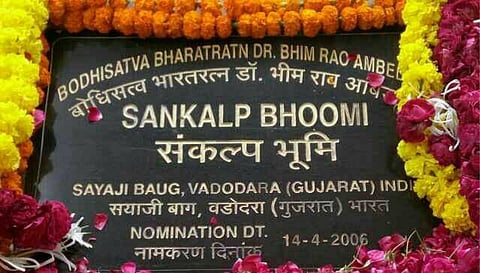
Vadodara- "Resolutions are meant to be broken," goes a saying prevalent in our society. This is particularly true about New Year's resolutions. Resolutions, most of the time, are a mere whim that could have arisen due to a frisson of anger, guilt, remorse, etc. Most of these resolutions are confined to personal ambitions, which have a tinge of revenge and tend to relent with the subsidence of the feelings over a period of time. However, some resolutions are so firm that they withstand every adversity and adversary and change the course of history. If Gandhi's expulsion from a well-deserved railway compartment due to racial discrimination set the course for a movement that fought racism in Africa and colonialism in India, being pushed out of a Parsi-owned inn in Vadodara sparked the fire in Bhim Rao Ambedkar that was to change the course of history forever.
The incident that changed Ambedkar's life took place in Baroda. After completing his studies at Columbia University in New York in 1913, Ambedkar was appointed as a probationer in the Accountant General's Office by the Maharaja of Baroda. He was bound to serve the Baroda state as he was educated by the Baroda State. He went straight to Baroda. He recalls in his autobiography, "Waiting for a Visa," "My five years of stay in Europe and America had completely wiped out of my mind any consciousness that I was an untouchable and that an untouchable, whenever he went in India, was a problem to himself and to others."
After arriving in Baroda, the biggest problem he faced was that of accommodation. Ambedkar went to a Parsi inn, presuming that there was no possibility of being treated as an untouchable because "their religion does not recognize untouchability." To his delight, he also managed to get a room, but this relief was short-lived. When Ambedkar undressed to be at ease, the caretaker who came there saw that he was not wearing the sadra and Kasti, the two essential Parsi accouterments worn by men.
The caretaker was shocked and asked who he was – to which the US-educated untouchable replied, "Hindu." The caretaker was visibly upset and told him that the place was exclusively for Parsis, to which Ambedkar suggested that he could enter his name as a Parsi. The caretaker agreed on the condition that he paid one and a half rupees per day for board and lodging. He agreed.
The newly appointed probationer lived peacefully for another 11 days, but one day, the Parsis in the neighboring areas got wind that he was staying there. Armed with lathis, they threatened Ambedkar to leave the place. He vacated the place after paying the bill, but the big question was – Where to go? The last few possible options were also over when he was denied a room by a Christian friend. It is not that he faced discrimination only while looking for accommodation. Even at the office, the fresh graduate from Columbia University was subjected to untouchability by his colleagues.
While in the case of Gandhi, his encounter with racial or any kind of discrimination was something unprecedented, Ambedkar did not face discrimination for the first time in Baroda in 1917 at the age of 26; the twinge of being an untouchable had singed him since childhood. But the incident at Baroda was a tipping point as he came across a deflating truth - an untouchable to a Hindu is also an untouchable to a Parsi, and also that the stigma of untouchability remained attached to him even after receiving a foreign degree. He decided to go to Bombay, but the train to Bombay left at 9 P.M. So he decided to spend the remaining time at a public garden, which was known as Kamauthi Bagh.
It is here that he made a resolution to dedicate his life to the eradication of the caste system and the upliftment of the Depressed Classes. This resolution was to bring many disruptions in the Indian social order in the future and also in the Republic of India. At 8 P.M., Ambedkar left the park to board the Mumbai-bound train, while his own life trajectory was to move through the glass-strewn path as he steered through many headwinds in his career.
This incident of 23rd September 1917 is remembered as Sankalp Diwas every year. And the place where he took the resolution is known as Sankalp Bhoomi. Kirit Rathod, a Dalit youth from Gujarat, spoke to The Mooknayak and said, "Babasaheb felt that he was facing discrimination despite being so educated and having a good job at Baroda state, so he decided to fight against this caste system, and people go to Sankalp Bhoomi and take the vow to take the Ambedkar movement forward." Over the last few years, Sankalp Bhoomi has attracted devotees from all over India, and every year, programs are held at the place – a Banyan Tree. Politicians like Rahul Gandhi and Mayawati have in the past visited the place and paid homage to the great man.
The National Monument Authority recommended in 2022 that this place, Sankalp Bhoomi Banyan Tree, be declared a Monument of National Importance. The other place for which this status was sought was Pratap Rao Bhosle High School, where Baba Saheb received his primary education. Both places laid the foundation for the making of the great man. Hopefully, the government will abide by the suggestion of NMA, which is a part of the Ministry of Culture. While Deeksha Bhoomi in Nagpur and Chaitya Bhoomi in Mumbai are ensconced in the hearts of Ambedkarites all over the world, Sankalp Bhoomi shall also get its due in the future.
Also Read-
You can also join our WhatsApp group to get premium and selected news of The Mooknayak on WhatsApp. Click here to join the WhatsApp group.